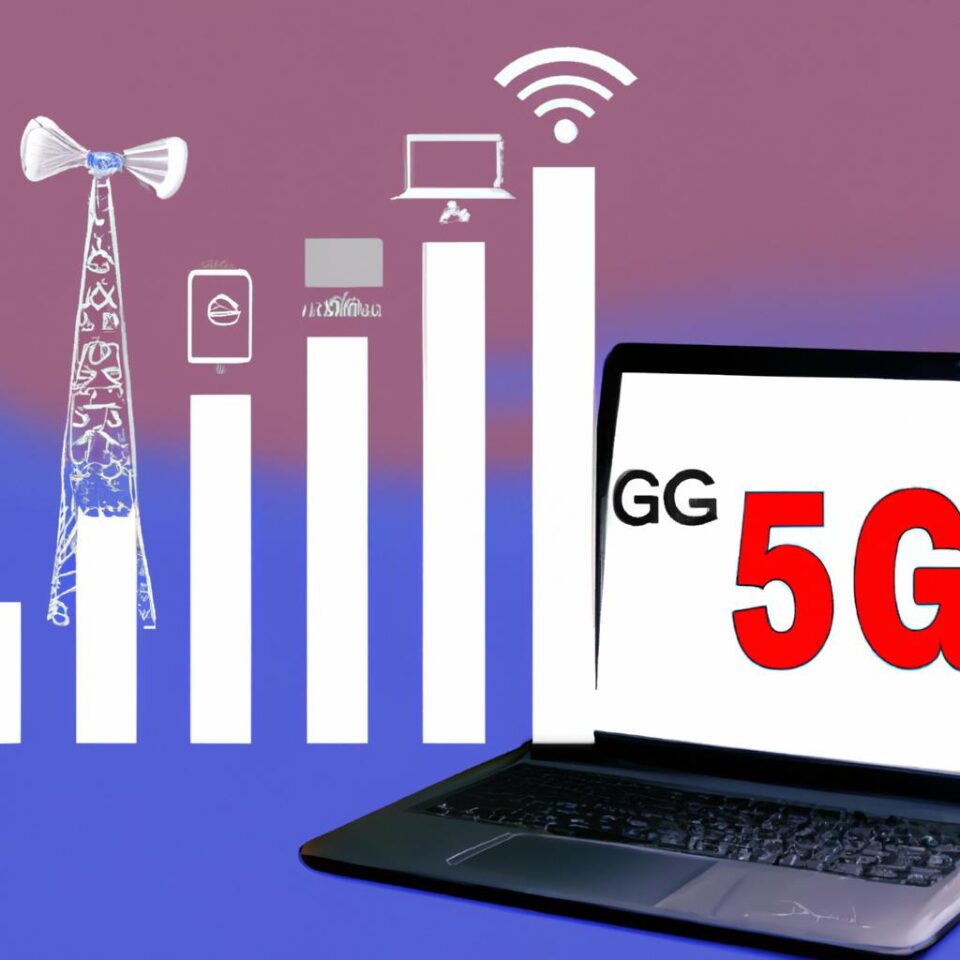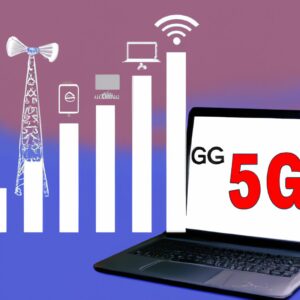What Is 5G Technology?
5G technology is the fifth generation of wireless data technology, and it has the potential to revolutionize the way businesses communicate. It is designed to provide faster speeds, lower latency, greater reliability and improved capacity compared to current 4G networks. It offers businesses the opportunity to access new services, such as real-time video streaming and the ability to monitor and control remotely located machines.
With 5G technology, businesses can expect a more engaging experience when connecting with customers. It can also help reduce the cost of operations by removing some of the technological barriers associated with traditional 4G networks. By taking advantage of advances in automation, analytics and artificial intelligence (AI), businesses can gain new insights into customer behavior and develop strategies that maximize their growth.
Benefits of 5G for Businesses
As 5G technology continues to evolve, businesses will be presented with new opportunities to improve their operations and increase efficiency. Here are some of the potential benefits 5G can offer businesses:
- Faster Data Speeds – With its advanced capabilities, 5G networks can provide up to 10 times the speed of current 4G networks, significantly improving the performance of business applications.
- Lower Latency – 5G networks have the potential to reduce latency, or the time it takes for information to travel from one point to another, by up to 90%. This can help improve the response times of applications, making them more efficient and reliable.
- Greater Capacity – The increased capacity of 5G networks can enable businesses to support more users and devices simultaneously. This can help them better serve their customers and expand their customer base.
- Enhanced Connectivity – 5G technology can allow businesses to make better use of IoT (Internet of Things) devices to expand their reach and better engage with customers.
What is 5G Technology?
5G technology is the fifth generation of mobile network technology that is set to revolutionize how businesses interact with customers and operate their networks. It is a huge leap forward in terms of speed, latency, and connection capabilities, allowing businesses to make use of advanced technologies such as virtual reality, artificial intelligence, and the Industrial Internet of Things.
5G is built on the latest in wireless infrastructure, utilizing millimeter wave frequencies to deliver speeds up to 20 Gbps. This increased speed allows for much larger data transmissions, allowing businesses to send more information in an instant. Combined with its low latency rate of less than one millisecond, this makes it very attractive for businesses looking for quick response times when communicating with customers or when running applications and services on their network.
The high-speed and low latency capabilities of 5G connectivity allow businesses to take advantage of new and emerging technologies such as cloud computing and augmented reality. It also significantly opens up the possibilities for the implementation of the Internet of Things, allowing businesses to streamline operations and increase efficiency.
The Benefits of 5G for Businesses
5G technology is rapidly becoming the new standard of communication networks. With its increased capabilities, businesses now have access to a wide range of benefits that can help them improve their operations. 5G technology can enable faster speeds, more reliable service, and lower latency rates, which can all lead to an improved customer experience. With its ability to handle higher loads of traffic, 5G can also support more devices, allowing for greater access to data and overall system efficiency.
One of the biggest impacts from 5G technology is the potential for increased revenues from enhanced customer experiences. With faster speeds and more reliable connections, businesses can offer customers a smoother and more efficient experience leading to return visits and increased sales. Additionally, the higher bandwidth of 5G can allow businesses to accommodate more customers at once, leading to improved customer satisfaction.
5G technology is also beneficial for businesses due to the reduced latency rates it provides. By supporting faster transmission speeds, 5G can reduce latency, meaning customers can access pages and data much quicker than with previous technologies. This can result in fewer abandoned purchases, meaning businesses are more likely to gain more customers and increase their revenue.
Finally, the security features of 5G technology provide additional benefits for businesses. By encrypting data transmissions, 5G can ensure that private information remains secure, reducing the likelihood of breaches or thefts. Additionally, 5G provides increased authentication features such as facial recognition, making it more difficult for unauthorized users to access sensitive data.
In conclusion, 5G technology can bring a variety of benefits to businesses. From a faster and more reliable customer experience to increased security, businesses can enjoy a wide range of advantages from the adoption of 5G technology. With these benefits, businesses can stay ahead of the competition and experience growth for years to come.
Current Use of 5G
The 5G revolution is already taking the world by storm. With faster speeds, improved connection stability and better coverage, this new technology is capable of transforming the way businesses communicate and operate. In fact, many companies have already begun to make use of 5G technology to improve their operations.
For example, some companies are using 5G to provide better customer service. By taking advantage of faster speeds, companies can quickly and easily access customer data, allowing them to provide a more personalised experience. On the production side, companies are using 5G to improve efficiency. By leveraging better data transfer speeds, they can quickly send and receive data from remote locations, allowing for more efficient production.
In addition, 5G technology has also opened up new opportunities in terms of automation. By automating processes such as inventory tracking and management, companies can save time and money. This in turn allows companies to streamline operations, reduce costs and improve customer service.
Finally, 5G has also enabled businesses to develop new services and products. By providing reliable, high-speed connections, companies can develop applications and services that weren’t previously possible, giving them a competitive edge in the market.
As we can see, 5G technology is already having a significant impact on businesses. By leveraging the full potential of this new technology, companies can increase efficiency, reduce costs and develop new products and services.
Potential Challenges With 5G Technology
When it comes to implementing 5G technology, businesses may face a variety of challenges ranging from technical issues to financial barriers. To ensure successful implementation, it is important to understand and prepare for these potential challenges.
Technical Challenges
One of the main challenges businesses will face when using 5G technology is on the technical side. This is because 5G networks require specialized equipment and infrastructure to be set up, which can be difficult and costly. Additionally, ensuring adequate connection speed and quality can also be challenging.
Financial Challenges
Another potential challenge businesses may face when implementing 5G technology is the associated cost. Although the cost of setting up 5G networks is likely to decline over time, it is still an expensive undertaking and may not be viable for all businesses.
Solutions & Strategies
To overcome the technical and financial challenges of 5G implementation, businesses need to have a clear understanding of the associated costs and resources required. They should also look for ways to reduce the upfront costs of setting up the network, such as taking advantage of shared infrastructure and working with third-party providers. Additionally, businesses should ensure that they have the right tools and expertise to manage the network effectively.
Security Concerns with 5G Technology
5G technology can offer businesses a number of benefits, but it brings with it some security concerns that need to be addressed. The speed and performance of 5G networks can create opportunities for malicious actors to target businesses’ systems, leading to potential data breaches. Additionally, as 5G works over radio waves, businesses and organizations may be at risk of interference from signal jamming if they have not implemented adequate measures.
To help mitigate the risks associated with 5G technology, businesses should consider implementing the following strategies:
- Ensure that all 5G networks are encrypted using strong encryption protocols.
- Employ comprehensive access control and identity management policies to protect against unauthorized access to 5G networks.
- Conduct regular monitoring and audits of 5G networks to detect any suspicious activity or unauthorized access attempts.
- Install anti-jamming solutions to protect against interference from external sources.
- Educate staff on the importance of cyber security and the threats posed by 5G.
If businesses can take the necessary steps to ensure the security of their 5G networks, they can drastically reduce the risks associated with these technologies.
Cost Considerations
Adopting 5G technology can be expensive for businesses, and there are a number of costs associated with implementing the new technology. Examples of these costs can include: infrastructure costs for hardware and software; data services fees; maintenance support costs; and training costs for employees.
The cost of 5G technology depends on the type and amount of infrastructure needed, as well as the coverage area and bandwidth required. Businesses operating in densely populated areas may find the cost to be higher than those operating in less populated areas, as more infrastructure will need to be deployed. Additionally, for businesses that require higher bandwidths, this is likely to result in increased costs.
For businesses that have limited resources, there are some methods that can be employed to reduce costs. For example, an organization can opt to use existing infrastructure and upgrade it with 5G capabilities. This can provide a low-cost solution, while allowing the business to benefit from the advantages of 5G technology.
It is also important to note that the cost of 5G technology will most likely decrease over time, as the technology matures and more providers enter the market. This can help to drive down prices, which can be beneficial for businesses looking to adopt 5G.
Conclusion
In conclusion, it is clear that 5G technology can bring a range of benefits to businesses, including improved speed, enhanced performance, and improved customer experiences. However, there are also some potential challenges that businesses may face in relation to the deployment and maintenance of 5G networks, along with security issues that need to be addressed. Additionally, the cost associated with investing in 5G technology should also be considered.
Overall, 5G technology has the potential to revolutionize the way businesses operate, however, it is important for companies to weigh up the potential pros and cons before making any decisions. For those businesses willing to take the plunge and invest in 5G technology, the rewards could be significant.
comments: 0

